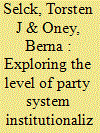| Srl | Item |
| 1 |
ID:
145630


|
|
|
|
|
| Summary/Abstract |
This article aims to analyze the dynamics of the party system in Turkey by focusing on the AKP and construct an aggregate-level analysis of the electoral environment it operates in using regression models (1950–2011). Findings show strong patterns of continuity in the electoral geography of Turkey since the 1970s, mapping electoral strongholds of center-right, ultra-nationalist and pro-Islamist parties compared to those of the AKP. As of 2015, the AKP seems to have achieved a great deal of stabilization electorally and there is now handful of data that can identify and answer some of the questions related to the AKP, especially regarding its ideology, origins, electoral strength and appeal.
|
|
|
|
|
|
|
|
|
|
|
|
|
|
|
|
| 2 |
ID:
114237


|
|
|
|
|
| Publication |
2012.
|
| Summary/Abstract |
When the 2011 parliamentary election campaign started, Turkish political parties promised to draft a new constitution in their manifestos. Not surprisingly, after the election, the political parties that gained representation in parliament reiterated this promise to their constituents. Furthermore, hopes for a new constitution have increased with the beginning of the legislative session because the above-mentioned political parties have agreed to join the negotiation process without presenting any pre-conditions. However, each party has its own agenda and hopes for a new constitution might collapse when these agendas appear during the negotiation process.
|
|
|
|
|
|
|
|
|
|
|
|
|
|
|
|
| 3 |
ID:
152447


|
|
|
|
|
| Summary/Abstract |
This article offers an analysis of the level of post-1980 Turkish party system institutionalization (PSI) and party system type. Although Turkey shares characteristics with both established and new democracies, no research has compared Turkey to both the established and new democracies with regard to PSI. Utilizing Croissant and Völkel’s four-dimensional index of PSI and Siaroff’s typology of party system type, this article shows that the level of Turkish PSI is higher than that of new democracies. The Turkish party system has not been fully institutionalized yet; however, the dominant party system introduces a certain degree of stability and predictability.
|
|
|
|
|
|
|
|
|
|
|
|
|
|
|
|
| 4 |
ID:
142293


|
|
|
|
|
| Summary/Abstract |
The academic literature on negative campaigning is growing. As an attempt to contribute to the theoretical and empirical knowledge on the phenomena, this study focuses on the Turkish elections and tries to provide answers to the following research questions: What is the level of negativity in Turkish electoral campaigns and which factors are salient for going negative for Turkish political parties? Findings display the fact that negativity is noticeably high in Turkey, and incumbency, ideology and time focus of messages are salient factors for negativity.
|
|
|
|
|
|
|
|
|
|
|
|
|
|
|
|